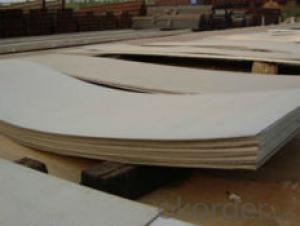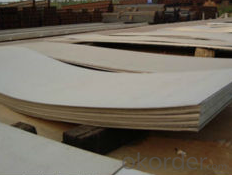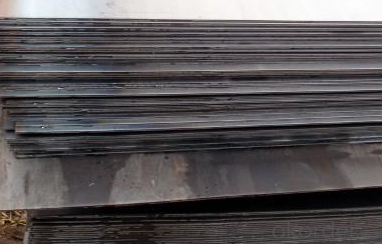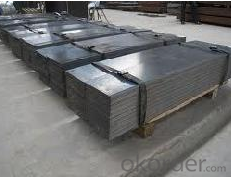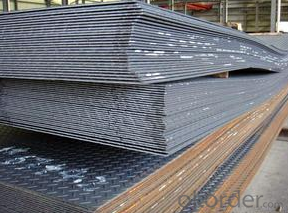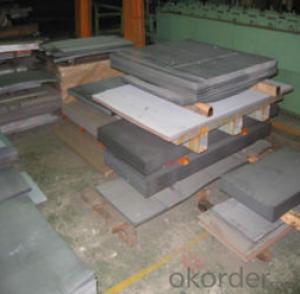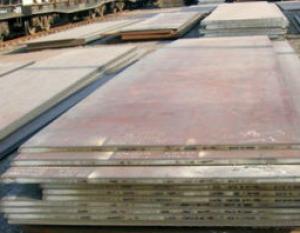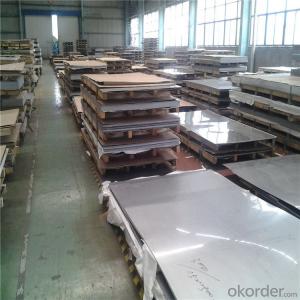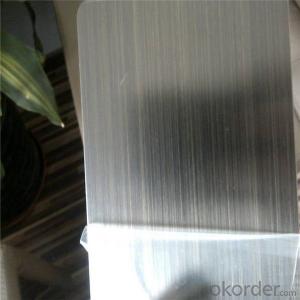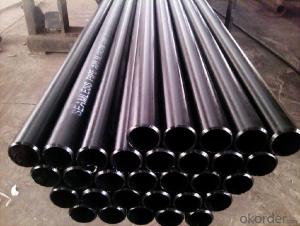316l Stainless Steel Sheet Price NO. 2 CNBM
- Loading Port:
- Qingdao
- Payment Terms:
- TT OR LC
- Min Order Qty:
- 10 pc
- Supply Capability:
- 30 pc/month
OKorder Service Pledge
OKorder Financial Service
You Might Also Like
Quick Details
| Grade: | 300 Series | Standard: | JIS, AISI, ASTM, GB, Other | Length: | 2000-6000mm |
| Thickness: | 0.3-80mm | Width: | 1000-2000mm | Place of Origin: | Zhejiang, China (Mainland) |
| Brand Name: | huaye | Model Number: | 316 | Type: | Plate |
| Application: | Foodstuff, Gas, metallurgy, biology, electron, chemical, petroleum, | Certification: | SGS |
Packaging & Delivery
| Packaging Details: | Standard export sea-worthy packing in wooden pallet. |
| Delivery Detail: | Normally 15-20 days |
Specifications
1)Surface: NO. 1, 2B, BA, NO. 3, NO. 4, HL, NO. 8 and so on.
2)Tickness: 0.3 to 4.0mm
3)Width: 31 to 1524mm
Specifications
1)Surface: NO. 1, 2B, BA, NO. 3, NO. 4, HL, NO. 8 and so on.
2)Tickness: 0.3 to 4.0mm
3)Width: 31 to 1524mm
4)Use: Decoation, industry etc.
About Products
1. We are a great agents of Chinese famous mills Baosteel, Tisco, Jisco, for S. S. Products, and some international famous mills POSCO, OUTOKUMPU.
2. Special dimension are acceptable.
3. Cutting & Slitting services are available.
4. Swift Lead time (usually about 20 days for ex-stock and processing).
5. Mill Inspection Certificate and Origin can be provided.
6. All material mentioned are in prime grades.
7. Coil weight: 05 to 20 tons(mainly).
8. We can supply materials with various surfaces(NO. 1, 2B, BA, NO. 3, NO. 4, HL, NO. 8)
Service Concept
The first customers become lifelong customers.
Others:
If you want to purchase some products to test the market, we can lower the MOQ
Delivery: Normally 15-20 days
Productivity: 5000-6000 tons/month
Packing: Standard export sea-worthy packing in wooden pallet
- Q: How are steel pipes protected against electrolytic corrosion?
- Various methods can be employed to safeguard steel pipes against electrolytic corrosion. One commonly utilized approach involves the application of protective coatings on the pipe's surface. These coatings serve as a barrier, effectively preventing direct contact between the steel and the surrounding environment, which may contain moisture and other corrosive substances. Epoxy, polyethylene, and zinc are frequently employed coatings for this purpose. Another means of protection involves the utilization of sacrificial anodes. These anodes, typically fabricated from a metal that exhibits greater reactivity than steel, such as zinc or aluminum, are affixed to the steel pipes. Over time, as these anodes corrode, they willingly sacrifice themselves in order to shield the steel. This process, known as cathodic protection, is exceptionally successful in deterring electrolytic corrosion. Aside from coatings and sacrificial anodes, proper insulation and electrical isolation play a pivotal role in preventing electrolytic corrosion of steel pipes. Insulating materials, such as rubber or plastic sleeves, are employed to prevent direct contact between the pipes and other metals or electrolytes. Electrical isolation can be achieved through the use of dielectric unions or insulating flanges, which effectively obstruct the flow of electric current between different sections of the pipeline. Furthermore, regular maintenance and inspection are essential components of protecting steel pipes against electrolytic corrosion. Regular checks to assess coating integrity, anode condition, and potential electrical leakage are crucial in maintaining the ongoing efficacy of the corrosion protection system. In conclusion, a combination of protective coatings, sacrificial anodes, insulation, electrical isolation, and regular maintenance is indispensable in safeguarding steel pipes against electrolytic corrosion. By implementing these measures, the lifespan of steel pipes can be substantially prolonged, thereby ensuring the safety and reliability of various applications, including water distribution, oil and gas transportation, and structural support in buildings and infrastructure.
- Q: How are steel pipes coated for protection?
- Steel pipes are commonly coated for protection using various methods such as galvanization, epoxy coating, and polyethylene wrapping. Galvanization involves immersing the pipes in a bath of molten zinc, forming a protective layer that prevents corrosion. Epoxy coating involves applying a layer of epoxy resin to the pipe surface, providing a barrier against moisture and chemicals. Polyethylene wrapping involves wrapping the pipes with a polyethylene material, offering insulation and protection against abrasion and corrosion. These coating methods ensure the longevity and durability of steel pipes, enhancing their resistance to environmental factors.
- Q: A333gr6 steel pipe and domestic material of the same?
- A333Gr.6 steel is no nickel steel is a kind of fine grain aluminum low temperature toughness of steel, therefore, also called Al killed steel. A333Gr.6 belongs to the United States ANSI and ASTM-SA333 cryogenic steel standards and is used at the lowest impact temperature of -46 degrees celsius. Its temperature, range of use and fracture toughness value are similar to those of domestic 16Mn steel (the minimum usage temperature of 16Mn steel is -40 degrees Celsius).
- Q: How are steel pipes used in the pharmaceutical industry?
- Steel pipes are used in the pharmaceutical industry for various purposes, including the transportation of liquids, gases, and chemicals, as well as for the distribution of water and steam. They provide a reliable and durable solution for the safe and efficient transfer of pharmaceutical products within manufacturing facilities and during distribution processes.
- Q: Can steel pipes be used for sewage disposal systems?
- Yes, steel pipes can be used for sewage disposal systems. Steel pipes are commonly used in sewage systems due to their durability, resistance to corrosion, and ability to withstand high pressure. They are suitable for carrying wastewater and sewage safely and efficiently.
- Q: Are steel pipes suitable for solar power plants?
- Indeed, solar power plants find steel pipes to be a fitting choice. Owing to their enduring nature, resilience, and ability to resist corrosion, steel pipes are commonly employed in the construction of solar power plants. They serve diverse purposes within these plants, encompassing the conveyance of fluids like water or heat transfer fluids, as well as proffering structural reinforcement for solar panels and other apparatus. Steel pipes excel at enduring high temperatures and pressure, thus rendering them an optimal choice for the efficient functioning of solar power plants. Moreover, steel pipes are readily obtainable and cost-effective, thereby establishing their popularity in the construction of solar power plants.
- Q: Can seamless steel pipe and ordinary steel pipe be welded?
- If your project is a seamless steel pipe, so theoretically, you put the tube with connected is not used.But the actual engineering operation, design drawings will be put on the normal need to improve the requirements of the drawings to the actual requirements, so if is the need of seamless steel pipe, welded pipe in the end so can you see yourself.
- Q: How do steel pipes handle abrasive materials?
- Steel pipes are highly resistant to abrasive materials due to their strong and durable nature. The smooth interior surface of steel pipes minimizes friction and wear caused by abrasive materials, making them an ideal choice for handling such substances.
- Q: How are steel pipes used in oil refineries?
- Steel pipes are used in oil refineries for various purposes such as transporting crude oil, refined petroleum products, and other chemicals throughout the facility. They are crucial for the overall infrastructure, including piping networks, storage tanks, and processing units, ensuring efficient and safe fluid flow.
- Q: What are the different methods of protecting steel pipes from corrosion?
- There are several methods of protecting steel pipes from corrosion. One common method is coating the pipes with materials such as epoxy, polyethylene, or fusion bonded epoxy, which create a barrier between the pipe's surface and corrosive elements. Another method is cathodic protection, which involves using sacrificial anodes or impressed current to prevent corrosion. Additionally, applying corrosion inhibitors or using corrosion-resistant alloys for manufacturing the pipes can provide protection. Regular maintenance, including inspections and cleaning, is also crucial to ensure the ongoing protection of steel pipes from corrosion.
Send your message to us
316l Stainless Steel Sheet Price NO. 2 CNBM
- Loading Port:
- Qingdao
- Payment Terms:
- TT OR LC
- Min Order Qty:
- 10 pc
- Supply Capability:
- 30 pc/month
OKorder Service Pledge
OKorder Financial Service
Similar products
Hot products
Hot Searches
Related keywords
